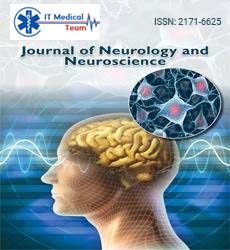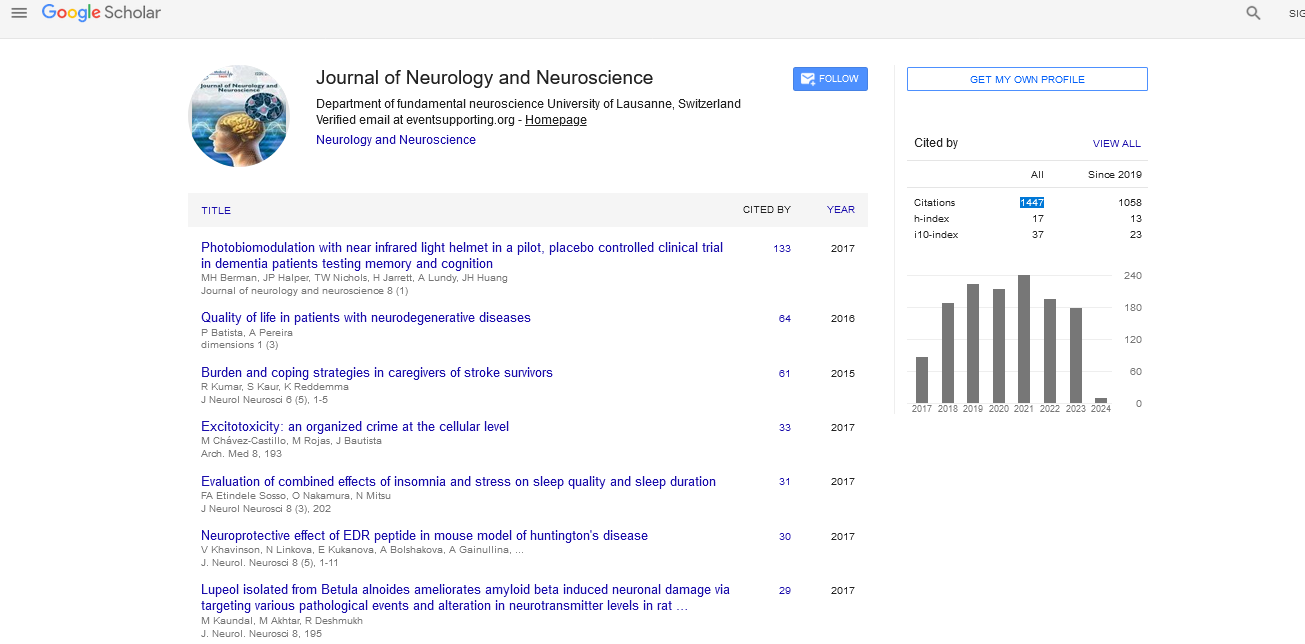Short Communication - (2024) Volume 15, Issue 3
A thorough overview of the microbiota-gut-brain axis and neurological disorders
Fionn Violeta*
Department of Radiology, College of Medicine and Health Sciences, United Arab Emirates University, United Arab Emirates
*Correspondence:
Fionn Violeta, Department of Radiology, College of Medicine and Health Sciences, United Arab Emirates University,
United Arab Emirates,
Email:
Received: 01-Jun-2024, Manuscript No. ipjnn-24-15255;
Editor assigned: 03-Jun-2024, Pre QC No. P-15255;
Reviewed: 15-Jun-2024, QC No. Q-15255;
Revised: 22-Jun-2024, Manuscript No. R-15255;
Published:
29-Jun-2024
Introduction
The Microbiota-Gut-Brain Axis (MGBA) represents a complex communication network linking the gut microbiome to the brain, playing a pivotal role in health and disease. Recent research has unveiled that the microbiome, a diverse community of microorganisms residing in the gastrointestinal tract, influences not only gastrointestinal health but also neurological function and behavior. This relationship has led to significant interest in understanding how dysregulation of the MGBA may contribute to various neurological disorders. The microbiota comprises trillions of microorganisms, including bacteria, viruses, fungi, and archaea, that inhabit the human body, primarily in the gut. These microorganisms are crucial for various bodily functions, including digestion, metabolism, immune regulation, and protection against pathogens. The composition of the microbiota is influenced by numerous factors, including diet, age, genetics, and environment, resulting in individual-specific microbial communities [1].
The gut microbiome is established shortly after birth, with significant development during infancy influenced by mode of delivery (vaginal vs. cesarean), breastfeeding, and exposure to antibiotics. The microbial composition continues to evolve throughout life, adapting to dietary changes and lifestyle factors. A diverse and balanced microbiota is associated with better health outcomes, whereas dysbiosis—an imbalance in microbial communities—has been linked to various diseases. The gut-brain axis encompasses bidirectional communication pathways between the gut and the Central Nervous System (CNS).
The vagus nerve is the primary neural pathway connecting the gut and brain. It transmits signals from the gastrointestinal tract to the brain, influencing stress responses, mood, and overall brain function. This connection allows the brain to respond to gut stimuli, which can affect behavior and emotional states. The gut microbiome plays a vital role in the immune system. It modulates the production of immune mediators, including cytokines and chemokines, which can affect brain function. Dysregulation of immune responses has been implicated in neuroinflammation, a contributing factor in various neurological disorders [2-4].
Gut bacteria produce a variety of metabolites, including Short-Chain Fatty Acids (SCFAs), neurotransmitters, and vitamins. SCFAs, such as butyrate, acetate, and propionate, have been shown to have neuroprotective effects and may influence brain health by modulating inflammation and neurotransmitter production. Additionally, gut bacteria can produce neurotransmitters like Gamma-Aminobutyric Acid (GABA) and serotonin, which play critical roles in mood regulation and anxiety. The gut microbiota also influences the Hypothalamic-Pituitary-Adrenal (HPA) axis, which regulates the body’s response to stress. Dysbiosis can lead to dysregulation of the HPA axis, potentially contributing to stress-related disorders and other psychiatric conditions. Studies have shown that alterations in gut microbiota composition are associated with anxiety and depression. For example, patients with major depressive disorder often exhibit reduced microbial diversity and specific microbial populations. Animal studies have demonstrated that probiotics can alleviate anxiety-like behaviors and improve mood, suggesting a potential therapeutic avenue. Research indicates that children with ASD often have distinct gut microbiome profiles compared to neurotypical peers. Dysbiosis in ASD may contribute to gastrointestinal symptoms commonly observed in these individuals, potentially influencing behavior and social interaction. Some studies have reported improvements in behavior following dietary interventions targeting gut microbiota.
Description
Emerging evidence suggests a connection between gut health and Alzheimer’s disease (AD). Inflammatory responses triggered by dysbiosis may contribute to neuroinflammation, a hallmark of AD. Moreover, certain gut-derived metabolites have b``een implicated in amyloid plaque formation, suggesting that gut microbiota could influence the pathophysiology of AD. Parkinson’s Disease (PD) has been linked to gastrointestinal disturbances, including constipation, which often precede motor symptoms. Studies have shown altered gut microbiota profiles in PD patients, with a decrease in beneficial bacteria. The gut-brain connection in PD may involve the propagation of α-synuclein, a protein associated with PD, from the gut to the brain. Multiple sclerosis, an autoimmune disease affecting the CNS, has been associated with changes in gut microbiota composition. Research suggests that certain microbial profiles may influence the immune response in MS, potentially exacerbating the disease. Probiotic and dietary interventions are being explored as potential adjunct therapies.
Probiotics—live microorganisms that confer health benefits—and prebiotics—substances that promote the growth of beneficial bacteria—have shown promise in modulating gut microbiota composition. Clinical trials are underway to assess the efficacy of specific probiotics in improving symptoms of anxiety, depression, and other neurological conditions. Diet plays a crucial role in shaping the gut microbiome. Diets rich in fiber, fruits, vegetables, and fermented foods have been associated with increased microbial diversity and improved mental health. The Mediterranean diet, in particular, has been linked to lower rates of depression and cognitive decline. FMT involves transferring fecal material from a healthy donor to a recipient to restore gut microbiota balance. While primarily used for treating recurrent Clostridioides difficile infections, FMT is being explored for its potential effects on various neurological disorders, with some preliminary studies suggesting improvements in mood and cognitive function. Emerging pharmacological strategies aim to target the gut-brain axis directly. Compounds that modulate gut microbiota composition, enhance SCFA production, or inhibit neuroinflammation are under investigation. These approaches could complement traditional treatments for neurological disorders [5].
Conclusion
The microbiota-gut-brain axis is a rapidly evolving field of research with significant implications for understanding and treating neurological disorders. The intricate interplay between gut microorganisms, the immune system, and the brain highlights the importance of maintaining a healthy microbiota for overall well-being. As research continues to uncover the complexities of the MGBA, new therapeutic strategies aimed at modulating gut microbiota may offer hope for individuals suffering from various neurological conditions. Understanding the role of the microbiota in neurological health not only opens avenues for innovative treatments but also emphasizes the necessity of a holistic approach to health that encompasses diet, lifestyle, and microbiome health. As we move forward, further research will be essential to fully elucidate the mechanisms underlying the microbiota-gut-brain axis and its potential impact on neurological disorders.
Acknowledgement
None.
Conflict of Interest
None.
References
- Rhee SH, Pothoulakis C, Mayer EA. Principles and clinical implications of the brain–gut–enteric microbiota axis. Nat Rev Gastroenterol Hepatol. 2009; 6(5):306-314.
Google Scholar, Crossref, Indexed at
- Cryan JF, O’Mahony SM. The microbiome‐gut‐brain axis: From bowel to behavior. Neurogastroenterol Motil. 2011; 23(3):187-192.
Google Scholar, Crossref, Indexed at
- De Palma G, Collins SM, Bercik P. The microbiota-gut-brain axis in functional gastrointestinal disorders. Gut Microbes. 2014; 5(3):419-429.
Google Scholar, Crossref, Indexed at
- Sudo N, Chida Y, Aiba Y, et al. Postnatal microbial colonization programs the hypothalamic–pituitary–adrenal system for stress response in mice. J Physiol. 2004; 558(1):263-275.
Google Scholar, Crossref, Indexed at
- Prehn-Kristensen A, Zimmermann A, Tittmann L, et al. Reduced microbiome alpha diversity in young patients with ADHD. PloS One. 2018; 13(7):e0200728.
Google Scholar, Crossref, Indexed at





